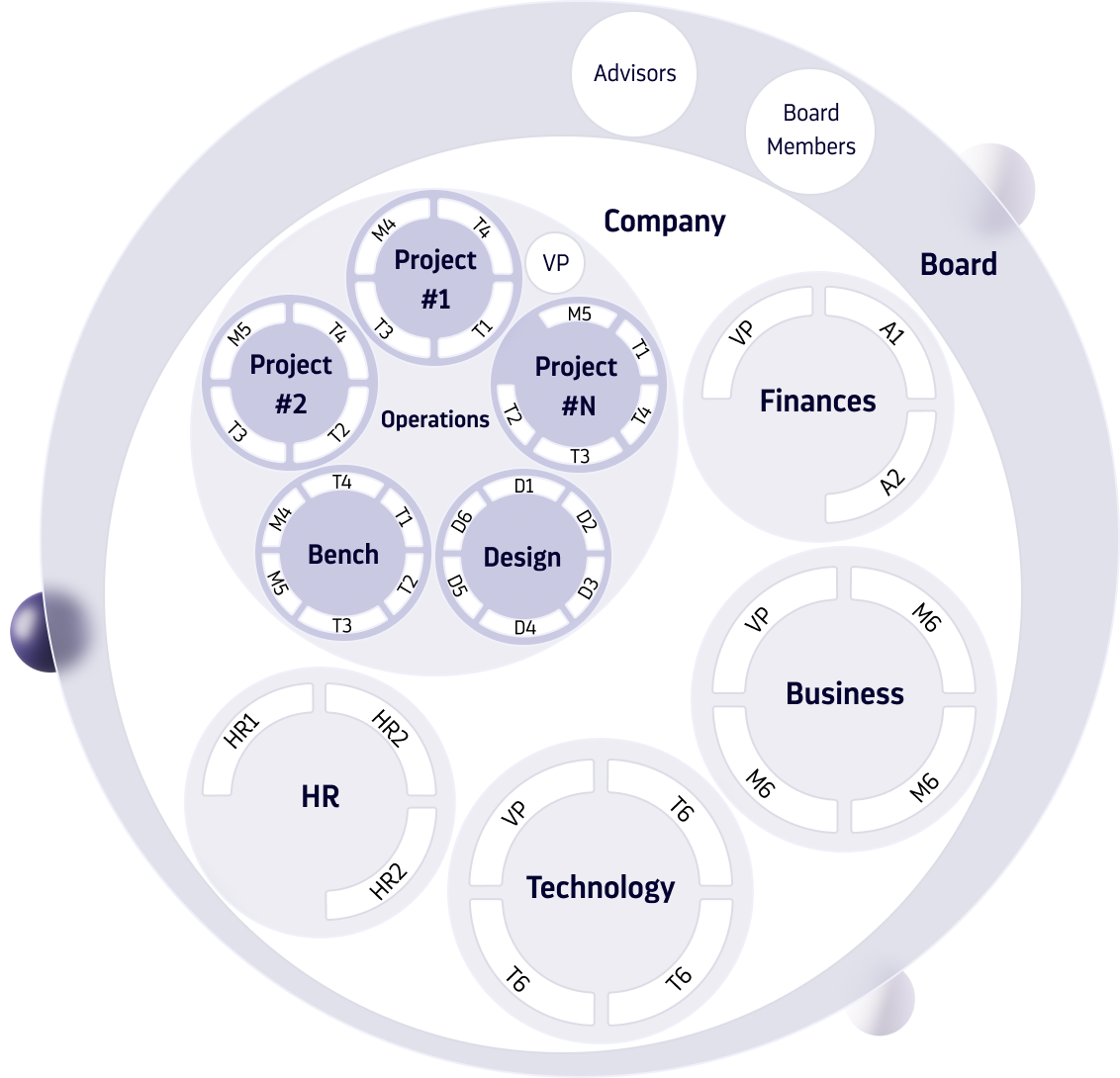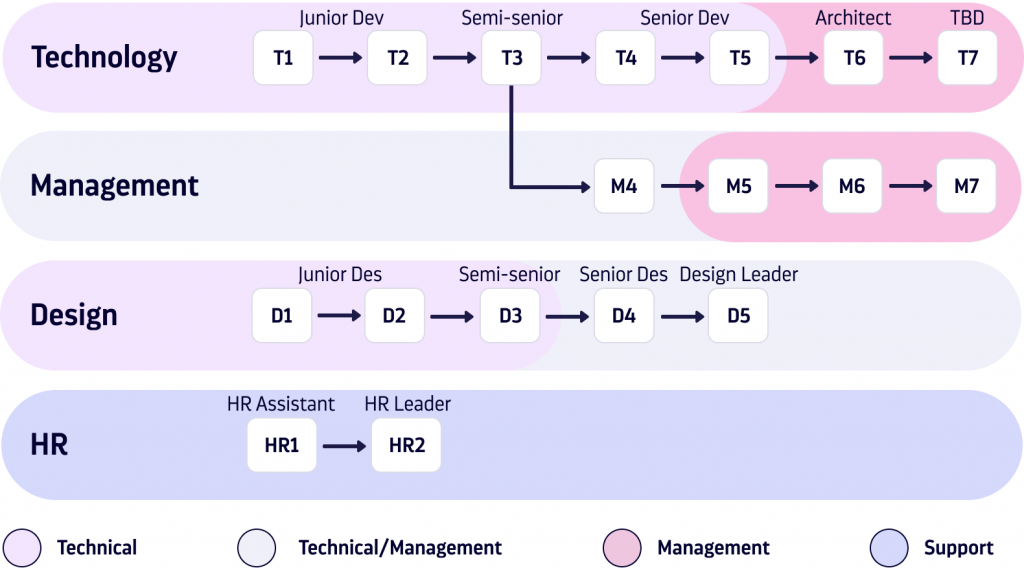How we give our team opportunities to learn and grow with a Career Framework
Everyone appreciates when their employer cares about their professional growth. In my experience, companies that provide employees with opportunities to pursue their career dreams and achieve objectives are also enabling the fulfillment of their own business goals, since happier employees are more engaged, more motivated and more productive.
The Career Framework is one of the tools we have to prioritize our employees’ growth and provide a broader perspective on how they can grow along with Octobot. It’s essentially a development path that works as a map, so every person knows where they stand and where they can go within the company.
In this article, I’ll explain how our Career Framework works and what the benefits are.
Why a Career Framework?
Over the last nine years, Octobot has grown from a 3-friend startup to an established company. As we grew, new roles and opportunities started to emerge, and people wondered about their career options and the direction and vision of the company. They started to ask the leadership team for more visibility.
The Career Framework arose as the ideal solution to provide clarity, making sure everyone understands how they contribute to Octobot and how they can evolve within the organization.
This tool is aligned with our holarchy structure. Following this organizational model, we organize our team members in holons; autonomous teams responsible for fulfilling a project or a set of goals. The holons are independent, flexible, and are created and dissolved according to organizational needs. They are freestanding organisms that are also part of the larger whole. This structure helps us to be more agile and efficient, while decreasing bureaucracy.

Our Career Framework mirrors this organizational structure perfectly, acting as a guide available to every team member. Each person is responsible for knowing where they stand in the framework and what steps they need to take in order to move to the next level.
Let’s explore in greater detail what that means exactly.
Career path development
As of today, our Career Framework is composed of four areas of expertise: Technology, Design, Talent and Management. Each area has its own lane, and within each lane there are different levels. The framework is built on the idea that when a person joins Octobot, they are assigned a role that matches a specific level inside the lane. As long as this person maintains employment, they will keep progressing in the framework, gaining new skills, capabilities, and responsibilities over time.

Each level and role in the framework has its own series of characteristics, abilities, and goals that are both attainable and challenging at the same time. Among the capacities listed in each level, there are technical knowledge and soft skills. An example:
Name of the role: Junior Developer
Description: Developer with no previous work experience, with a background in software development.
Responsibilities:
- Learn about Octobot technologies and working procedures.
- Develop the requirements of the project he/she is in.
- Build clear code that fits the guidelines and style of the project he/she is in.
- Perform clear and atomic commits, in independent branches.
- Handle merge requests properly, including the use of comments, branch selection and review tools.
- Use internal management tools following the Octobot process specification.
Capacities:
- At least 2 years of formal education in programming.
- Training in Relational Databases.
- Training in Systems Architecture.
- Computer Networking training.
- Experience in software projects within the educational field (e.g. Fing Programming Workshop).
- Experience using the English language
Skills:
- Learns new things easily, quickly putting into practice the information he receives.
- Understands the abstractions and architectural guidelines with which he/she is confronted.
- Is organized, works in an orderly manner and manages his/her time properly.
What the Career Framework is not:
- It’s not a rigid, hierarchical structure where we establish who’s boss
- It’s not a salary scale
- It’s not a list of tasks
Moving up the career ladder
Differing from more traditional frameworks, changing levels here is an opportunity to grow and evolve, rather than a simple promotion. That means we don’t expect the person to obtain all of the necessary skills before they move forward in the lane, we provide the opportunity to learn by doing.
Team members are encouraged to follow the path they think is best for them, according to their interests and passions. If at some point a person wants to change lanes, it’s also possible. Let’s say a designer discovers her true passion is to become a developer, or an engineer decides he wants to lead a team: there’s always room to discuss and make such changes.
In order to advance levels in the framework, there are some considerations to keep in mind:
- There must be a vacancy in the organization. We always prioritize internal talent to fill open positions, before hiring externally.
- There aren’t specific time requirements that dictate when a person should advance, but in general we expect people in the first three levels (T1, D2, etc) to stay at least one year in each role before moving forward. In the more advanced roles, we expect at least two years experience before ascending a new level. This is our recommendation so the person can gain enough experience and knowledge before moving ahead.
These considerations are not mandatory for changing roles. You don’t need to be 100% on top of all the required responsibilities, capabilities or skills to move to the next stage. But you should be open and interested in developing them along with the new challenges that will come your way. Our yearly auto-evaluation and feedback activities are key when setting new career goals.
Besides the Career Framework, there are other resources the company provides so people constantly evolve their skills. Coaching initiatives, internal projects, training and educational activities are just some of the practices in place. This way, we not only give people the map for growth, we also provide the right tools for the journey to become the professionals they want to be.
Benefits for both sides
Each role brings an individual benefit to the employee’s professional life, but the Framework also captures how each level impacts the whole organization. As someone progresses on the path, they will increase their skills and evolve their seniority. This means they will become more relevant and more valuable to the company and to their colleagues. Employees from higher levels are responsible for sharing their knowledge and mentoring those just starting out.
We developed this Framework in 2020, after months of research and thoughtful discussions among the team. Existing career frameworks such as the ones from Spotify and Google were inspirations, but we quickly realized this was not something we could simply copy and paste, nor did we want to. Each organization is as unique as its people, so we strived to create our own mechanism.
By giving our people a flexible and attainable route for growth, we’ve seen an improvement in team morale, motivation and productivity. Also, candidates that value professional growth are drawn to our culture, which supports our hiring objectives. In addition, the framework is a key resource that equips our leadership team with the visibility to set up teams, take on new projects, and determine the best course for the business.
The Career Framework is a work in progress, and we’re constantly looking for ways to improve it. Everybody on the team is welcome and encouraged to share ideas and offer insights on how we can make it a more useful, inspiring tool. We keep evolving together, as individuals and as one Octobot.
Talking about interesting tools and practices in the workplace, I want to invite you to listen to this episode of OctoTalks, our podcast in English, in which we interview Nekosi Nelson, a leader who revolutionized Google’s hiring process.
TL;DR: Listen to this content in our podcast
Recently, I talked about our Career Framework at Octobot’s podcast. Listen to it here (in Spanish only):
See related posts

Essential Tools for Delivery Leads
One of our Delivery Leads, reveals his range of the best tools for successfully managing multiple project delivery responsibilities.

